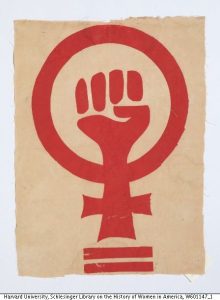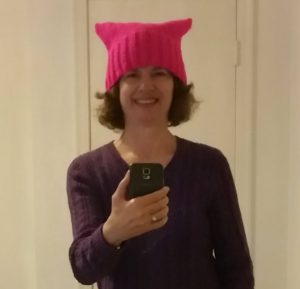Posting this on International Women’s Day!
- * * * * * * *
Posting this on International Women's Day! * * * * * * * I was a feminist long before I knew such a word existed.
I was a feminist long before I knew such a word existed. When I was a child, adults who knew my father, a doctor, frequently asked me, “When you grow up are you going to be a nurse and help your father?” This outraged me even then. Why should I be a nurse instead of a doctor?! Not that I wanted to be either one, but that wasn’t the point. I always knew that I could be a doctor, or anything else I chose, and there were no limits on what I could do, because that’s what my very progressive parents raised me to believe.
At my high school, we were annoyed when the girls had to take two years of home economics, while the boys had one semester of nutrition and three semesters of free period, but we weren’t yet aware that this was something we should be protesting. My class was the first to elect a girl as class president (no, I wasn’t that girl), but when she then ran for president of student council, the school elected a boy instead. Not surprising. In those days I learned that being a very smart girl in high school was a liability, even at a school which was entirely college prep. Interestingly, when I got accepted to Radcliffe, I was finally cool enough, and was the only female member of the Ivy League Cutting Society, along with the 7 boys who were going to Yale, Princeton, Columbia, Brown, and Dartmouth. (Just to be clear, “cutting” here meant cutting classes, not self-mutilation.) I was also elected graduation speaker, as described in my graduation story, Up, Up and Away.
When I arrived at Harvard-Radcliffe, I thought that the 4:1 ratio of boys to girls was a big attraction, and would make life on campus divine, but I quickly learned that being in such a minority was not so great. By sophomore year we were demanding co-ed dorms, not because we cared about living with guys, but because their housing options were so much better than ours. By senior year we were demanding equal admissions, and at Commencement we wore silk-screened cloths with this symbol pinned to the back of our academic gowns.
By senior year we were demanding equal admissions, and at Commencement we wore silk-screened cloths with this symbol pinned to the back of our academic gowns.
What had happened in the interim?
Eating as a guest in the Harvard Freshman Union (the boys’ dining hall), where when a pretty girl came in, all the boys would clink their forks against their glasses. It was hard to know which was more embarrassing – if they clinked, or if they didn’t.
Being ignored in classes by professors because there were so many more boys, all of whom thought what they had to say was the most brilliant thing ever.
Being called a “Cliffie bitch” if you ever argued with a boy or suggested that you might know more about a topic than he did.
Attending consciousness-raising sessions with other women, sharing experiences of sexism, so that we began to realize that it wasn’t just an individual’s problem, but all of ours.
Reading Our Bodies Ourselves, published by the Boston Women’s Health Collective on newsprint in 1971, and learning what the medical community had never told us. (I still have my original copy, the pages slightly crumbling.)
Reading Ms. Magazine, first as an insert in New York Magazine in Dec. 1971 (my parents were subscribers), then getting the first standalone issue in Jan. 1972, and seeing article after article that described exactly what I was feeling.
Taking the first Women’s Studies class at Harvard in 1971, with History and Literature professor Gail Parker (who became president of Bennington College the next year), and reading books by early feminists like Charlotte Perkins Gilman and Mary Wollstonecraft.
Having the president of Harvard say that equal admissions was not a possibility because Harvard’s role was to educate future leaders, and if they admitted more women it would mean admitting fewer men and therefore fewer future leaders.
And all that was just in the four years I was in college, 1968-1972.
When Helen Reddy sang “I am woman, hear me roar, in numbers too big to ignore,” I felt she was speaking to me and for me. The guys I knew laughed at the song and thought it was silly, but to me it was empowering and I sang along at the top of my lungs.
After college I got a job I wasn’t really qualified for by wearing a very short skirt to the interview. Okay, sometimes sexism has its benefits. When the married guys in the office came on to me, and I turned them down, luckily there were no repercussions for me. I know plenty of other women for whom that was not true.
In 1978, when I was a full-fledged lawyer and had gotten my first professional job, in the California Attorney General’s Office, my boss asked me to get him a cup of coffee. I didn’t say a word, but I was shocked and my face must have shown it, because he immediately said, “Never mind. I’ll have my secretary get it for me.” I suppose I should have appreciated that he recognized his mistake, but I couldn’t help thinking, “Why can’t you get your own damn coffee?!”
Now in 2017, after forty years of slow but steady progress, we are seeing a shocking backlash. I can’t even contemplate going back to the bad old days. The Women’s March on January 21st was the first sound of us roaring again. I can only hope that it will continue, and that, as the song says, “No one’s ever gonna keep [us] down again.”




Suzy, going to Radcliffe in ’68 is so different than my experience two years later at Brandeis, which was founded in 1948 and was always co-ed. They opened up co-ed dorms my first year, though I lived in an all-female dorm. The only rule was “Rule 22 – be discreet”. Really, anything went; sleep-overs in the dorm, sex, drugs, whatever. It never occurred to us to NOT speak up in class, that we wouldn’t be called on because the guys were smarter. Women were radicalized, but we didn’t seem to have to fight as hard because there wasn’t as much push back. The campus grew up being so liberal. Thanks for sharing your interesting look into how the Ivies had to change their ways with the times and what a strong woman can accomplish.
Well, I almost went to Brandeis, that’s where I would have gone if I hadn’t gotten into Radcliffe. I wonder if I would have been happier there. As to our not speaking up in class, it wasn’t that the guys were smarter, it was just that they never stopped talking! And there were so many more of them!
What a clear, coherent, and moving chronicle! The short, episodic pieces, each one a critical experience in your development flowed from one to the next with such grace and good humor. This list approach would make a great memoir structure. Loved this! Thanks!
Thanks for your praise, Charlie, it means a lot! Writing 43 stories for Retrospect over the past year is almost enough to make me consider writing a memoir.
I love your whole story, but especially your account of the multitude of “click” events that precipitated the radical changes between arriving at Radcliffe in 1968 and leaving Harvard in 1972. I was one of those traditional young men who probably clinked my glass for you in the Freshman Union, but fortunately Patti and my classmates assumed the mission of enlightening me. I hope I wasn’t too slow a study.
That silkscreen logo kicks ass! I vote we revive it.
Thanks John. Do you remember the whole glass-clinking thing? I think I only ate in the Union once freshman year, but that was enough! And I had been warned by other Cliffies. I can’t imagine what it would have been like for someone who didn’t know.
I agree about the logo. I think other groups still use the female symbol plus fist, but maybe not with the equal sign as well.
You know, I didn’t remember it, but your mentioning it rang a muffled bell. A lot changed during our freshman year and it might not have lasted the year. In the fall, men had to wear a coat and tie just to be admitted, but by spring that rule was flouted so often that the administration just let it slide. It had bigger issues to worry about after the bust and the strike.
Classmate Barbara Slavin posted these comments on the Retrospect facebook page, and has graciously allowed me to repost them here:
Dear Suzy. Very much enjoyed reading this. I went the SDS route rather than the feminist one in college and withdrew when the movement became dominated by the Progressive Labor Party that wanted us all to quit and make shoes in Framingham to get closer to the working class. I do remember now that during the takeover of University Hall in ’69 the women (including me) were put in charge of making sandwiches….
I ran off to Europe in the summer of ’71 and to Russia in ’72 to learn the language and something useful. Russians were then as now extremely macho. US male chauvinism didn’t really hit me in the face until my first job, as a secretary in a publishing house in NYC. My boss, whose illiterate memos and letters I turned into proper prose, hit on me during a trip to a book fair in true Madman style. I pushed him away very effectively and went on to a career in journalism where women were beginning to break into top reporting ranks but not without a struggle. And you tell the kids today about all the crap we put up with and they don’t believe you! On the other hand, they — and we — are learning that we will have to fight to preserve the rights we have gained and to keep this country moving in a hopeful and progressive direction.
I can attest to the fact that guys clinked our glasses when women entered the Freshman Union. I actually do not recall that there was any evaluating of the “girl’s” looks. Given the 100s of boys seated in a wide swath of tables, I don’t think we could even necessarily see her! We just clinked.
While it’s no doubt true that the talkative guys made it very hard for women to get their perspectives heard in classes that involved discussion, I actually recall most of my classes as being completely sedentary without any students discourse. I also recall at least one professor who would always report the mean scores by gender, and the point he kept ramming home to us was that the Radcliffe women were much the higher achievers. (This was a gen ed science course, for what it’s worth.)
Suzy, am reading your 2017 story now a month short of the 2020 election.
Wearing our pussy hats back then at those women’s marches and reveling in our unity and our perceived strength, little did we know how much worse it would get.
May we prevail.